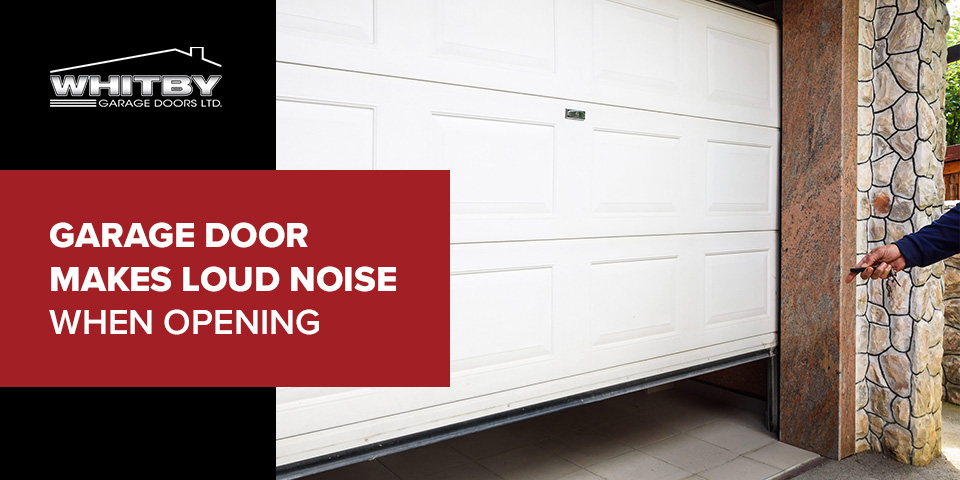Garage Door Makes Loud Noise When Opening

You rely on your garage door to access your house multiple times daily. When your garage door starts making banging sounds while opening and closing, you might have a serious issue on your hands. Regular wear and tear can cause garage door springs to break or fail, leading to loud noises and preventing your door from working correctly. If you’re experiencing banging sounds with your garage door, springs might be the problem.
Use this guide to learn more about fixing a noisy garage door and broken springs.
Why Is My Garage Door So Loud When Opening?
It’s normal to hear some noise when using your garage, especially if it’s an older build. However, if the garage door bangs when opening or closing or makes other loud sounds like straining, it could be a sign of something wrong. Sudden loud or unusual sounds could indicate several problems that need immediate attention.
Spring issues are common reasons garage doors make banging noises. The springs could have broken, lost torsion or they might need lubrication. Some springs may just have normal wear that require maintenance or adjustment. If you suspect your garage door springs are causing performance problems, loud noises or you heard a loud bang, contact a professional for help immediately. Garage springs are powerful and can be dangerous if handled improperly.
Why Are Garage Door Springs Important?
Garage doors are large, heavy objects made out of wood or most commonly a galvanized steel with an insulated polyurethane core. Springs make lifting the garage door manually and automatically easier and safer. Garage doors have two main types of springs — extension and torsion springs — which help open and close the heavy door. Torsion springs are typically found on the wall over larger garage doors and are most commonly used. Extension springs sit on the sides or above the horizontal tracks and are used less often due to performance issues.
Without these springs, you would have to manually open and close the garage door and all of its weight, which is dangerous and may leave your garage at risk for unwanted entry. This heavy weight will also strip your garage door openers gear.
Signs Your Garage Door Springs Need Repair
Once you start noticing issues like stalled performance or abnormal noises, perform a visual inspection of your garage components to try and identify if the springs are causing the problem. Some signs of damaged or broken springs are when the garage door:
- Makes banging noise when opening and closing: If your garage door bangs when closing or opening, you could have a broken torsion spring. The spring could be causing the sound as the door hits the floor, leaving the door without the tension it needs to open and close correctly.
- Won’t open at all: If your garage door doesn’t open at all, the springs could be the cause. Don’t try to force the door open if it wants to stay shut — you could get injured.
- Opens and closes with resistance: If you manually open your garage door and it’s suddenly much harder to open, it’s usually the springs. The springs aren’t taking the weight correctly and will need repair or replacement.
- Hear a loud bang: If you hear a loud bang coming form the garage it most likely means the spring has broken. This will also drop the cables off the drums and you will see loose or dangling cables on both side of the garage door. Do not try to open your door, it will only cause more issues.
Springs can cause many garage door problems, so carefully inspect the door systems. To help prevent spring issues, check your garage door springs and other components monthly, if possible. Regular visual inspections can help you catch problems early before they become expensive replacements. Avoid handling the springs yourself to reduce the chances of injury and door damage.
Ways to Fix a Noisy Garage Door
You can fix some garage door issues yourself if you work carefully. More complicated repairs should be left to professionals, as garage doors are heavy and can cause harm. You can perform minor tuneups every spring in addition to these fixes to help maintain your garage door. If you feel confident handling minor repairs, here are some possible solutions for your garage door problems:
Lubricate the Door
If you hear squeaking sounds or other noises, your garage door might need lubricating. The hinges, bearings, pulleys and rollers could cause squeaking or grinding if they have too little or no lubrication to make movement easier. Check the garage components for damage and rust and apply a garage door lubricant to the necessary sections. Consider replacing your rollers with nylon rollers, which don’t need lubrication, to help reduce the amount of lubrication you need for your garage.
You should also regularly lubricate your springs, especially torsion springs. If the springs can’t move smoothly, it can lead to the garage door making banging noises while operating. Once you’ve applied lubricant to the squeaky part, continue lubricating your garage door parts regularly. This keeps them working smoothly and quietly while preventing damage to your door.
Clear the Track
Sometimes debris or dirt can build up on the track, blocking it from working correctly and causing unusual sounds. In addition to regularly lubricating your components, keep them clean and clear. Any buildup can lead to blocks, further damage or expensive repairs. Clean out tracks and sections before regular lubrication to help maintain the garage.
Tighten the Nuts and Bolts
Loose screws and bolts can cause loud noises as well. These are often easily fixed with tightening. Take a wrench and socket and retighten the noisy components. Be careful not to over-tighten the nuts and bolts — this can lead to stripping or other damage. Always disconnect your garage opener to prevent the door from opening while working on it.
When to Call a Professional
If you’ve lubricated your garage door springs, cleared the tracks of debris, tightened loose nuts and bolts and still have trouble with your garage, it might be time to contact a technician. If you have broken springs or can’t find the cause of the issue — leave the garage door alone. Garage doors are heavy and broken springs can lead to serious injuries if handled without professional training.
Never try to replace springs yourself. Springs are under constant tension and have a lot of power stored up. A spring can break suddenly, hurting you or damaging the surrounding area. Metal spring pieces are sharp and could hurt your face, skin or eyes.
If you have a broken garage door spring, schedule a repair with a technician immediately. On a double-door replace both springs even if only one is broken. The load of the door is balanced upon both springs, meaning if one went the other will break shortly after. The longer you wait, the more expensive repairs can get, so don’t wait to call.
Trust Whitby Garage Doors for Spring Repair
Don’t leave your garage door damaged — contact a professional garage door service for top-of-the-line repairs and replacements. At Whitby Garage Doors, our technicians have the experience and training to quickly and safely repair and replace your garage door springs. Trust our team to deliver high-quality garage door services so you can return to using your garage door.
Contact us to request a service today!
